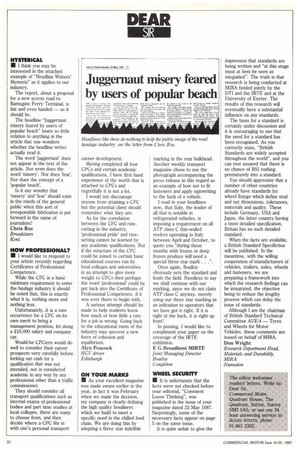WHEEL SECURITY • It is unfortunate that the facts were
Page 34

If you've noticed an error in this article please click here to report it so we can fix it.
not checked before your editorial, "Comment Loose Thinking", was published in the issue of your magazine dated 23 May 1987. Surprisingly, some of the necessary facts appear on page 5 on the same issue.
It is quite unfair to give the impression that standards are being written and "at this stage must at best be seen as misguided". The truth is that research is being conducted at MIRA funded jointly by the DTI and the IRTE and at the University of Exeter. The results of this research will eventually have a substantial influence on any standards.
The basis for a standard is certainly under discussion and it is encouraging to see that the need for a standard has been recognised. As you correctly state, "British Standards are widely accepted throughout the world", and you can rest assured that there is no chance of BSI rushing prematurely into a standard.
You should appreciate that a number of other countries already have standards for wheel fixings which define stud and nut dimensions, tolerances, materials and quality. These include Germany, USA and Japan, the latter country having a most detailed specification. Britain has no such detailed standard.
When the facts are available, a British Standard Specifiction will be published. In the meantime, with the willing cooperation of manufacturers of vehicles, trailers, axles, wheels and fasteners, we are preparing a framework into which the research findings can be integrated, the objective being to reduce the lengthy process which can delay the issue of standards.
Although I am the chairman of British Standard Technical Committee AUE/4 — Tyres and Wheels for Motor
Vehicles, these comments are issued on behalf of MIRA. Don Wright
Research Department Head, Materials and DurabiliO, MIRA Nuneaton




































































































